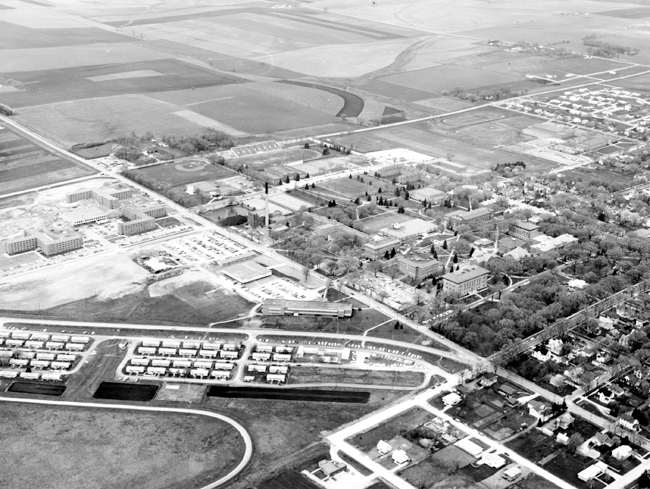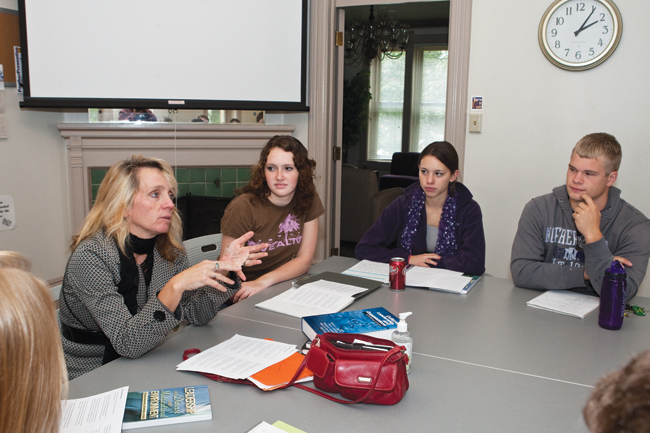INTRODUCTION TO THE SELF-STUDY
Founded in 1876, The University of Northern Iowa (UNI) is recognized in the nation and Iowa as a leading public comprehensive university.[1] Since its last Higher Learning Commission (HLC) visit for continuing accreditation in 2001, the University has undergone a number of transitions in senior leadership, significant budget challenges, major organizational restructuring, and a new strategic planning cycle.

A number of changes in senior leadership have occurred during the past decade. Robert Koob, who served as UNI’s president since 1995, retired in 2006. That same year, the University’s search for a new President resulted in the appointment of Benjamin Allen, UNI’s current President. At the beginning of the decade, Aaron Podolefsky served as the Provost and Vice President for Academic Affairs, a position he left in 2005 to assume the Presidency at the University of Central Missouri. James Lubker, Dean of the College of Humanities and Fine Arts, served as the Interim Provost from 2005 to 2009 and then retired from the University. Gloria Gibson became the new Executive Vice President and Provost in July 2009. In addition, Thomas Schellhardt became the Vice President for Administration and Financial Services in 2002 and Terrance Hogan became the Vice President of Student Affairs in 2007. There also have been new appointments in the positions of the Associate Provost for Academic Affairs and the deans of all five undergraduate colleges, the graduate college, continuing education and special programs, and the library since the last self-study. Most recently, a new dean for the College of Education was hired in May 2010. Another important change to note is that the previous Associate Provost for Academic Affairs was the original coordinator of this self-study. When she left the University in spring 2010, two new self-study co-coordinators were appointed.
During the past decade the University has also dealt with two recessions. The first occurred between FY01 and FY03. These recessions lead to a general fund appropriations reduction by approximately $8.5 million. In fall 2008, a far more serious recession began which greatly impacted the state economy. From FY09 through FY11, appropriations have decreased from $98,286,381 to $79,005,927. This is a decrease of $19,280,454 or 19.6%. Of major concern is the fact that $6,683,783 of this amount was enacted as one-time appropriations. All University employees agreed to take either furloughs or temporary pay cuts (depending on their unit) in spring 2010. The University also temporarily reduced TIAA-CREF employer contributions from 10% to 8% of salary from November 30, 2009 through the June 30, 2011 payroll.
To maintain quality in this difficult economic climate, the University has recently made some strategic decisions to more efficiently allocate its resources. As the review team reads this document, it should be aware that a number of significant changes occurred during or after this self-study was written. For example, in 2008 UNI launched its first-ever comprehensive market-research project. This has resulted in the development of a comprehensive brand position for the University that will be launched in fall 2010, but has not yet been made public. In spring 2010 it was announced certain units would be reorganized, but these are not mentioned in the self-study because the reorganization was still in its very early stages when the self-study was finished. These include: dissolving the Marketing & Advancement Division as of July 1, 2010, which reduces the number of administrative divisions in the University from four to three, and eliminates one vice president position; combining the College of Natural Sciences and the College of Humanities and Fine Arts (to be completed by June 2011), which reduces the number of undergraduate colleges from five to four; combining the department of English Language and Literature with the Department of Modern Languages; and redefining the position of Associate Provost for Academic Affairs as the Associate Provost for Academic Affairs and Dean of the Graduate College. A search was in progress to fill this Associate Provost/Dean position when this self-study report went to press. Administrative positions have been restructured, including: an Associate Provost for International Programs; two new associate deans for the combined college created out of the College of Natural Sciences and the College of Humanities and Fine Arts; a sustainability coordinator; and a new Liberal Arts Core Coordinator.
It is also important to note that, because the most recent strategic planning process did not begin until the self-study report was largely completed, the self-study reflects the mission, vision, and goals of the 2004-2009 strategic plan. A draft of the new 2010-2015 plan can be found in Appendix A of this document. The Board of Regents is scheduled to approve the plan at their September meeting.
Despite these significant changes in senior leadership, budget  challenges, and organizational restructuring, the University of Northern Iowa has continued to strive for excellence in all of its endeavors. In light of UNI’s strong commitment to high-quality undergraduate education and its desire to have a meaningful and effective self-study, UNI elected to undertake a customized self-study by completing the First-Year Project, a joint effort between the Higher Learning Commission and the John N. Gardner Institute for Excellence in Undergraduate Education (formerly known as the Policy Center on the First Year of College) that requires participation in the Foundations of Excellence®. This program guides universities through a comprehensive self-study process focused on the first year of college as the foundation of the entire undergraduate experience, and culminates in an action plan for institutional improvement.
challenges, and organizational restructuring, the University of Northern Iowa has continued to strive for excellence in all of its endeavors. In light of UNI’s strong commitment to high-quality undergraduate education and its desire to have a meaningful and effective self-study, UNI elected to undertake a customized self-study by completing the First-Year Project, a joint effort between the Higher Learning Commission and the John N. Gardner Institute for Excellence in Undergraduate Education (formerly known as the Policy Center on the First Year of College) that requires participation in the Foundations of Excellence®. This program guides universities through a comprehensive self-study process focused on the first year of college as the foundation of the entire undergraduate experience, and culminates in an action plan for institutional improvement.
It became evident through this self-study process and our work in the First-Year Project that the experience of our transfer students, in addition to our first-year students, was very important. As a result, and in keeping with our goal of striving for excellence in all that we do, the University is now participating in the Foundations of Excellence® project focusing on transfer students.
The University dedicated itself to conducting a self-study process that would be meaningful and transparent, and that would facilitate campus learning and continuous improvement. Thus, an intentional decision was made, even during these difficult budget times, to include all recommendations developed in the HLC and Foundations of Excellence® self-study process, even those that might require significant budgetary reallocations. Recognizing that it might not be possible to implement all of these recommendations at the present time, (although one-time ARRA funds were used in FY10 to implement some of the recommendations) the self-study documents them for future consideration when the budget climate improves.
